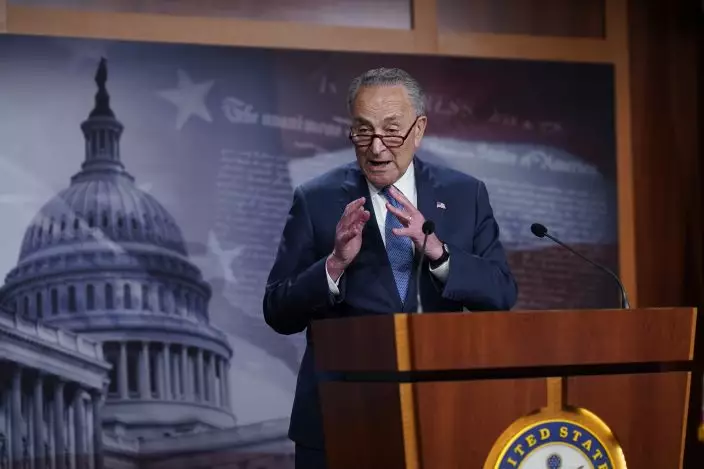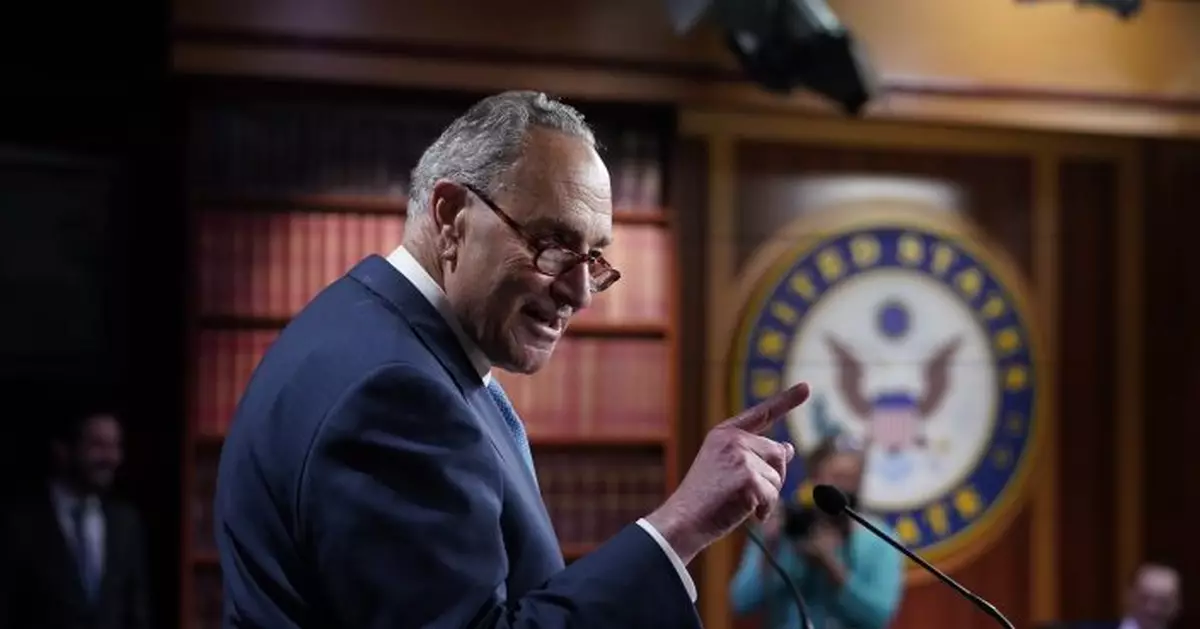Senate Majority Leader Chuck Schumer is setting a June vote on an elections overhaul bill, a Democratic priority that confronts restrictive new voting laws emerging after Donald Trump’s defeat and puts pressure on lawmakers to change Senate rules to overcome Republican opposition.
Fresh off Friday's failed vote on legislation establishing a commission to investigate the Jan. 6 insurrection, the Democratic leader sent colleagues a memo outlining a summer agenda that he said “will test our resolve.” Republicans on Friday blocked the commission bill, 54-35, relying on the higher threshold of the filibuster as they downplay the deadly Capitol attack by Trump supporters.
“We have seen the limits of bipartisanship,” Schumer told reporters at a press conference after the vote. “Everything’s on the table.”

Senate Majority Leader Chuck Schumer, D-N.Y., speaks to reporters after final votes going into the Memorial Day recess, at the Capitol in Washington, Friday, May 28, 2021. Senate Republicans successfully blocked the creation of a bipartisan commission to study the Jan. 6 attack on the Capitol by rioters loyal to former President Donald Trump. (AP PhotoJ. Scott Applewhite)
As the elections legislation S.1 comes to a vote, it will serve as a proving ground for Democrats on whether they can unify their own ranks around a rules change to make it easier to pass legislation on a simple majority vote.
The filibuster is a time-honored Senate tradition that requires a vote by 60 of the 100 senators to cut off debate and advance a bill. With the Senate evenly split, Democrats would need the support of 10 Republicans to move most bills, showing the limits of their ability to advance President Joe Biden's agenda. Some want to change the rules to 51 votes for measures to advance.
Changing the rules would require the support of a majority of senators, but not all Democrats are ready to do so. Two centrists, Sen. Joe Manchin of West Virginia and Kyrsten Sinema of Arizona, are holdouts against any efforts to alter the filibuster, preferring to stick with the current practice that is seen as a way to foster bipartisan compromises with Republicans.
But the two senators expressed exasperation with Republicans ahead of Friday's vote, imploring their colleagues not to stand in the way of a bipartisan commission to investigate the assault by a mob loyal to Trump seeking to overturn Biden's election.
Manchin told reporters afterward that the vote was “disheartening.”
Far from waning, Trump's persistent attacks on the integrity of the 2020 vote are sounding alarms among Democrats, and some Republicans, that more must be done to shore up Americans' faith in the civic process. The former president's claims have been dubbed the “big lie.”
Despite Trump's repeated accusations of voter fraud, dozens of judges and elections officials across the nation, along with his own attorney general, have found no evidence of a rigged election.
The bill headed for a vote, the For the People Act, is vast, tackling a range of interrelated issues that Democrats say will protect the vote and curb special interests but that Republicans say is too broad a federal reach into state and local election systems.
It would mandate early voting, same-day registration and other long-sought changes that Republicans reject. The measure would also require dark money political groups to disclose anonymous donors. A version has already been approved in the House.
Senate Republican leader Mitch McConnell has warned Democrats off any changes to the filibuster, though leaders of both parties have changed the rules over the years for votes on confirmation of judicial and executive branch nominees.
Congress is now out for a weeklong Memorial Day recess. In the letter to colleagues, Schumer said the bill would come to a vote the last week of June.


